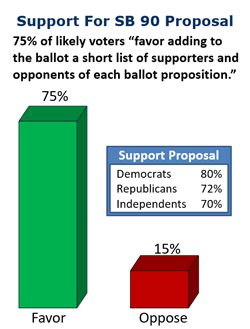As political action committees pour millions into
often-vicious campaign advertising in the Republican
presidential primaries, the most outrageous thing is the
murky source of funding: Donors behind the ads usually
aren't identified until after the primary is over.
California could prevent that from happening in state and
local elections with a bill coming to a vote Tuesday in the
Legislature. The California DISCLOSE Act would make sure
that political ads placed by PACs prominently name the top
three people or corporations that have contributed $10,000
or more. It wouldn't cover federal elections -- Congress
has to deal with them -- but at least it would bring
clarity to ads for and against California candidates and
measures.
Opposition is strong from moneyed interests that would
prefer to anonymously slime candidates they don't like.
Lawmakers need to stand up for what's right. With virtually
no legal options to limit this kind of advertising or the
amounts of money going into it, disclosure of backers is
the only way voters can judge it.
California already requires more disclosure than most
states or the federal government, but there's plenty of
room for improvement. On campaign ads, major political
donors can still hide behind the meaningless names of
political action committees like "Citizens for the Future."
The California DISCLOSE Act would require at least the
biggest donors -- individuals, corporations, unions or
other organizations -- to be presented in easily readable
type or, in the case of media like radio, understandable
narration.
Voters need this information. More than $127 million was
spent by special-interest PACs in California from 2000 to
2010, according to the state's Fair Political Practices
Commission. Spending in the current decade could make that
look like pocket change.
The measure sponsored by Assemblywoman Julia Brownley,
D-Los Angeles, goes further than the current rules, which
allow TV ads to bury the names of the top two PAC donors
behind the committee name and other $10,000-plus donor
names to be disclosed in an obscure place on the California
Secretary of State's website. The DISCLOSE Act would
require political ads to refer to the PAC's website showing
the top five funders, with a link to the Secretary of
State's web page that shows the rest.
For federal elections, a DISCLOSE Act passed the House of
Representatives in 2010 but failed in the U.S. Senate. U.S.
Rep. Anna G. Eshoo, D-Palo Alto, is still working to enact
some of the same provisions through amendments to other
bills, and she has urged President Barack Obama to do more
to force disclosure within his executive power.
California can take the lead with its own DISCLOSE Act,
which is endorsed by Eshoo and California Common Cause. The
bill, AB 1148, has passed two committees in the Assembly
and faces a crucial floor vote Tuesday or it will
expire.
Its chances have dimmed since the California Chamber of
Commerce announced its opposition this week. But
legislators need to come down on the side of voters and
transparency.
It may cost them some campaign contributions. On the other
hand, it might protect them from the kinds of vicious hit
pieces that are rarely seen unless backers can skulk in
anonymity.





